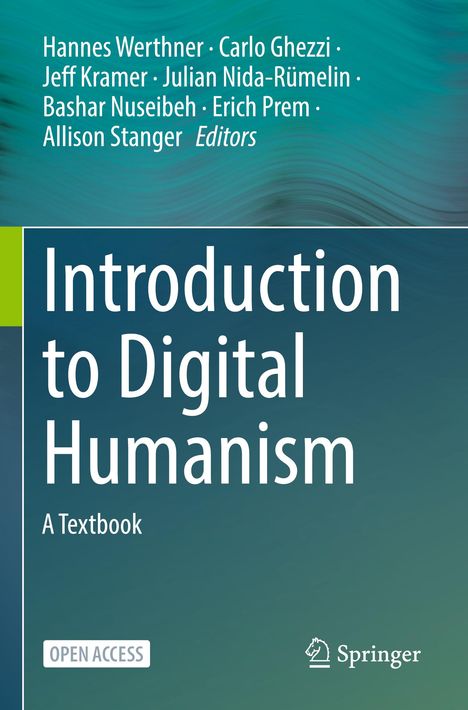Introduction to Digital Humanism, Kartoniert / Broschiert
Introduction to Digital Humanism
Buch
- A Textbook
- Herausgeber:
- Hannes Werthner, Carlo Ghezzi, Jeff Kramer, Allison Stanger, Bashar Nuseibeh, Erich Prem, Julian Nida-Rümelin
- Verlag:
- Springer Nature Switzerland, 12/2023
- Einband:
- Kartoniert / Broschiert, Paperback
- Sprache:
- Englisch
- ISBN-13:
- 9783031453069
- Artikelnummer:
- 11751075
- Umfang:
- 652 Seiten
- Nummer der Auflage:
- 23001
- Ausgabe:
- 1st ed. 2024
- Gewicht:
- 972 g
- Maße:
- 235 x 155 mm
- Stärke:
- 35 mm
- Erscheinungstermin:
- 21.12.2023
- Hinweis
-
Achtung: Artikel ist nicht in deutscher Sprache!
Klappentext
This open access textbook introduces and defines digital humanism from a diverse range of disciplines. Following the 2019 Vienna Manifesto, the book calls for a digital humanism that describes, analyzes, and, most importantly, influences the complex interplay of technology and humankind, for a better society and life, fully respecting universal human rights.The book is organized in three parts: Part I Background provides the multidisciplinary background needed to understand digital humanism in its philosophical, cultural, technological, historical, social, and economic dimensions. The goal is to present the necessary knowledge upon which an effective interdisciplinary discourse on digital humanism can be founded. Part II Digital Humanism a System s View focuses on an in-depth presentation and discussion of the main digital humanism concerns arising in current digital systems. The goal of this part is to make readers aware and sensitive to these issues, including e. g. thecontrol and autonomy of AI systems, privacy and security, and the role of governance. Part III Critical and Societal Issues of Digital Systems delves into critical societal issues raised by advances of digital technologies. While the public debate in the past has often focused on them separately, especially when they became visible through sensational events the aim here is to shed light on the entire landscape and show their interconnected relationships. This includes issues such as AI and ethics, fairness and bias, privacy and surveillance, platform power and democracy.
This textbook is intended for students, teachers, and policy makers interested in digital humanism. It is designed for stand-alone and for complementary courses in computer science, or curricula in science, engineering, humanities and social sciences. Each chapter includes questions for students and an annotated reading list to dive deeper into the associated chapter material. The book aims to provide readers with as wide an exposure as possible to digital advances and their consequences for humanity. It includes constructive ideas and approaches that seek to ensure that our collective digital future is determined through human agency.
Biografie (Julian Nida-Rümelin)
Julian Nida-Rümelin studierte Philosophie, Physik, Mathematik und Politikwissenschaft in München und Tübingen, lehrte Philosophie und politische Theorie in München, Minneapolis, Tübingen, Brügge, Göttingen und Berlin (1993-2003 o. Professor für Philosophie an der Universität Göttingen, seit 2004 Ordinarius für politische Theorie und Philosophie an der Universität München) und war Kulturstaatsminister im ersten Kabinett Schröder.
Introduction to Digital Humanism
EUR 43,80*
